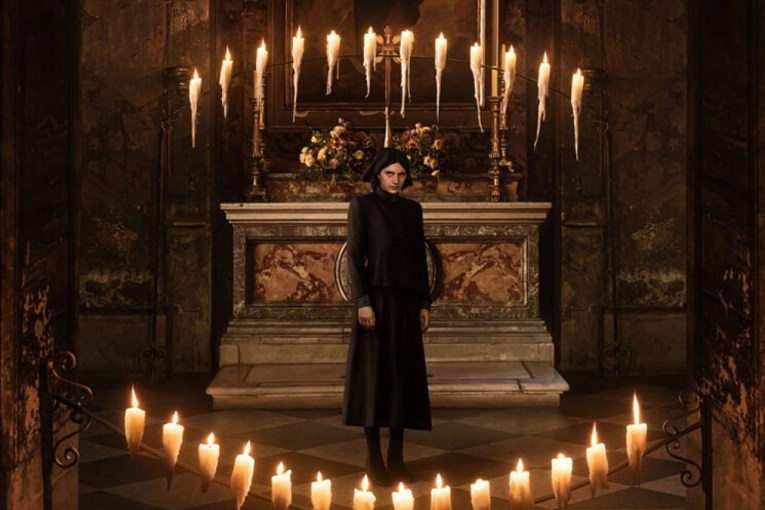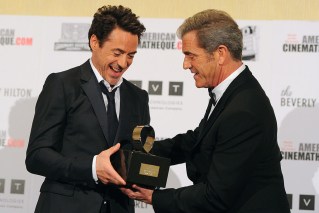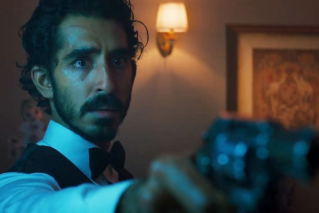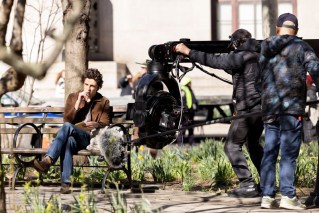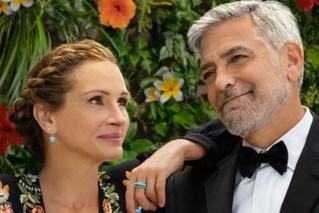Sofa Cinema: rediscover the classics

Friday December 13, 2013
Rear Window (1954)
In the mid-1950s three of the most dominant Hollywood names were Alfred Hitchcock, James Stewart and Grace Kelly, so this film had a head start. Having set the scene in LB Jefferies’ (James Stewart’s) apartment, the first action is the arrival of girlfriend Lisa (Grace Kelly) whereupon they exchange a slow motion, close-up kiss. That simple kiss is today still named as one of the most erotic moments in all cinema, so we’re off and away. Jefferies is a magazine photographer limited to his apartment by a broken leg caused by getting too close at a motor racing event. He fills in the time by becoming a voyeur; that is, spying on his neighbours through binoculars. And he believes a murder is committed. The biggest problem is convincing Lisa, detective friend Tom Doyle (Wendell Corey) and wise-cracking nurse Stella (Thelma Ritter). Electric suspense, supreme cast.
Treasure Island (1950)
Of all the dozens of film and television versions of Robert Louis Stevenson’s epic tale, this 1950 version by Walt Disney’s studios is far and away supreme. It was filmed in England with all English actors except for the major role of Jim Hawkins, played by gifted American child actor Bobby Driscoll. The script is amazingly loyal to dialogue written by Stevenson, and the acting honors go to Robert Newton in a spectacular presentation of Long John Silver, revered to this day. Also Finlay Currie’s opening performance as the drunken dying Captain Billy Bones is almost alarming. Thrilling, moving, gripping, it engages from start to final sweet scene in an old-fashioned story as only RL Stevenson could tell them. And what luminous names: Long John Silver, Blind Pew, Ben Gunn, Squire Trelawney, Israel Hands. Also, Cornwall’s Admiral Benbow Inn, and the good ship Hispaniola glow and creak in glorious Technicolor.
Friday December 6. 2013
My Week With Marilyn (2011)
How do you replicate Marilyn Monroe on the screen? You don’t, you just do the best you can. In 1955 the world’s greatest star, Marilyn Monroe, travelled across the Atlantic to make a film with the world’s greatest actor, Sir Laurence Olivier. It was called The Prince and the Showgirl and this is the story of their encounter. Olivier was the director and he became impatient and frustrated, viewing Monroe as being inept, lazy, unreliable. But gradually we see a change. “When Marilyn gets it right you just do not want to look at anyone else,” says someone. Those who saw the original 1955 movie will know that Marilyn emerges with all the screen genius, and Olivier is pedestrian, as he often was away from the stage and Shakespeare. Kenneth Branagh plays the faltering Olivier delicately; Michelle Williams’ performance as Monroe was nominated for the best actress Oscar.
The Dam Busters (1955)
There is no more authentic or respected World War II movie than The Dam Busters. Not only is it based on a true story but it was made only ten years after the war’s conclusion, thus the memories were still vivid. This is acutely reflected in the atmospheres of the film, most notably the war-time dialogue, and the sound effects of enemy flak and the engine hum inside a Lancaster bomber. Richard Todd is supreme as heroic British Wing Commander Guy Gibson and Michael Redgrave moody and dark as inventor Barnes Wallis. The plan is for a squadron to fly over Germany and bomb crucial dams using an ingenious technique. We don’t see Germans, there is no ugly jingoism, nothing triumphant; just a sombre relentless tone of the penetrating tragedy of war. Original book by Australian war pilot and author Paul Brickhill.
Friday November 29, 2013
Gallipoli (1981)
Often now forgotten, Peter Weir’s Gallipoli is one of the finest Australian films from the new wave renaissance of the 1970s/80s. Pre-celebrity 25-year-old Mel Gibson and Mark Lee play two Aussie lads excited by the prospect of enlisting for Word War 1, totally unaware of what war is. David Williamson created a skilled script from the war-time diaries of Diggers. Watch for the mesmerising moment when Bill Hunter as Major Barton is in his tent the night before attack, very aware of what he is sending his men to meet. On a wind-up phonograph he plays a scratchy record of the famous duet from Bizet’s The Pearl Fishers, and himself whistles the second verse. This is an admirable and moving evocation of a deeply tragic episode in war history, memorably brought alive by characters, incidents, script, and superb direction.
The Apartment (1960)
Billy Wilder was one of the Hollywood greats, directing such gems as Some Like It Hot, Sabrina, Sunset Boulevard, The Seven Year Itch. The Apartment stars the peerless Jack Lemmon as humble insurance clerk C.C Baxter, who lends his New York pad to company executives for their illicit trysts, most notably his boss Jeff D. Sheldrake (Fred McMurray) whose reluctant mistress is lift girl Fran (Shirley MacLaine). Although this is seen as a comedy for its more hilarious moments, it is in fact a biting social comment delicately written and played by a master team. Jack Lemmon was at his peak and the wistful Shirley MacLaine demonstrates an immense early talent. Fred McMurray as the heartless philanderer has some of the best lines (“One of our employees had an accident. I don’t know why they bother me with these things on Christmas day.”) This movie is timeless.
Friday November 22, 2013
Sleepless In Seattle (1993)
All of Julia Roberts, Michelle Pfeiffer, Kim Basinger and Jodie Foster turned down the lead role of Annie. How soothing that in the end it went to the sublime Meg Ryan. You can complain that it’s schmaltzy, unlikely, sentimental and even plagiarising in that it actually screens shots from the beloved 1957 Cary Grant classic An Affair To Remember. But it doesn’t matter; it’s still one of the most gripping of all comedy romances. Widower Sam, charmingly played by Tom Hanks, has a cute young son Jonah (Ross Malinger) who rings a national radio talkback show from their Seattle home, seeking a new wife for his dad. Across the nation in Baltimore, Annie (Meg Ryan) just happens to be listening. The unlikely Tom Hanks is now the biggest box office star of all time.
Brassed Off (1996)
Many interpreted this movie as an indictment of the Margaret Thatcher years in Britain. A small mining town in northern England disintegrates when its colliery is closed, as seen through the eyes of the local brass band. The band music, almost the centre of the film, is oddly rapturous, particularly a flugel horn solo of Rodrigo’s En Aranjuez Con Tu Amor. A romance develops between players Andy (Ewan McGregor) and Gloria (the enchanting Tara Fitzgerald), but Pete Postlethwaite steals the show as Danny the leader of the band. Steven Spielberg once described the late Postlethwaite as “the best actor in the world”. The northern accents are real, the faces are captivating, the pain is palpable, yet it has gloriously funny moments. As one patron said “you have to keep a sense of humor to survive when life kicks you in the gut”.
Friday, November 15, 2013
The Gay Divorcee (1934)
It seems impossible that this glorious movie was actually made 80 years ago. Fred Astaire and Ginger Rogers made ten together, and this was the second, and the one that sent them towards fame. Black-and-white, with super sharp editing techniques, no stereo but a marvellous Hollywood orchestra with rich arrangements. The highlight: Fred Astaire is pursuing a reluctant Ginger Rogers. As he talks we hear Cole Porter’s wondrous Night And Day. Then he is singing, and suddenly moves into dance, and finally she submits into his arms and they are away. Perfect. Is there anything in the history of cinema more dazzling than this beautifully dressed pair in full flight? The story, as usual, is quite silly, but who cares…it’s Fred and Ginger at their best, utterly breathtaking. Fred’s legs, incidentally, were insured for more than $300,000.
Manhattan (1979)
Arguably this is Woody Allen’s best film, although it was his own least favorite. It is also possibly the best film ever made about New York City. The characters are vile, flaunting adultery, hypocrisy, duplicity, greed. They are contrasted against the glory of New York, not only the familiar skyscrapers and bridges but also the back streets, the rows of brown houses, the traffic. You can smell this hypnotising city. Isaac (Woody Allen) is 42 and has a 17-year-old girlfriend Tracy (Mariel Hemingway), a venomous ex-wife Jill who “ran away with another woman” (Meryl Streep) and is also attracted to his married friend Yale’s mistress (Diane Keaton). Gershwin’s lush music illuminates all the New York shots with the grubby behaviour strung in between. There’s a wonderful cinematic moment where Tracy is brushing her hair, and suddenly stops. Somehow, black-and-white enhances the beauty of everything.
Doug Aiton is a Melbourne-based journalist, broadcaster and film buff.
